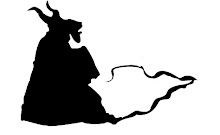“Kick-Ass” features Cage as Big Daddy, a man who’s part Batman and part Mr. Rogers. By day he wears cardigan sweaters and sips hot cocoa, by night he dispenses justice at the end of a shotgun. Actually, most of the justice dispensed by Big Daddy is at the hands of his 11-year-old daughter whom he’s trained in the deadly arts of gunplay, swordsmanship, and being deceptively adorable. So in that sense he’s sort of the third party administrator for justice. Hit Girl, played by a precocious young actress whose previous film credit was “Tigger and Pooh and a Musical Too”, delivers up a thoracic surgeon’s ransom in carnage all the while mouthing off to the bad guys with language that would make a veteran merchant mariner blush.

(There is a carnival of madness just behind this man's handlebar mustache.)
There are other heroes as well but it’s these two that stole the show and I really would like the two of them to get the credit they deserve for their roles because, more than the other characters, they subvert all the comic book hero conventions. In the universe of “Kick-Ass” a scrawny 6th-graders and her soft spoken father are more dangerous than an army of mob hitmen. In every other comic book film they would have died in the first scene in order for the superhero to spend the rest of the movie avenging them. We in the audience cheer for Big Daddy and Hit Girl yet, at the same time, are we really supposed to be rooting for a man who trains his daughter to kill with sociopathic glee and who is himself, to put it mildly, crazier than a barrel of Glenn Becks?
More than the gallons of blood I think this is what has the moral outragers morally outraged. But that’s the point of the film. Behind every bad-ass killing machine is a man with severe psychological problems, behind every hero is a frightened child, and not often, but sometimes, two wrongs do make a right.
© 2010 Dan Howard.
All rights reserved.
Work cannot be reproduced for any reason without consent of Dan Howard.



No comments:
Post a Comment